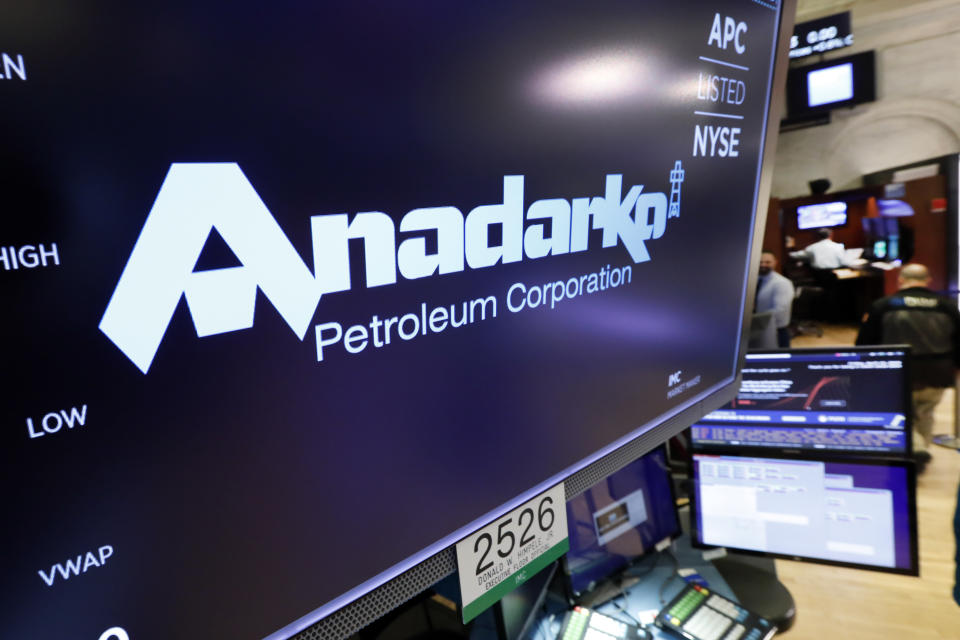What Warren Buffett thinks of his Occidental investment after shares crashed with oil prices
Occidental Petroleum (OXY) this week slashed its dividend to 11 cents from 79 cents per share,in the face of tumbling oil prices and a heavy debt load from its $37 billion acquisition of Anadarko Petroleum.
To get the cash to complete that purchase, Oxy sold $10 billion of preferred stock to Warren Buffett, whose 8% dividend was unaffected by Tuesday’s payout cut for common shareholders.
That $200 million quarterly payment to Buffett perhaps helps soften the blow of a more than 50% tumble in the stock since the oil price crash Monday and the more than 70% pullback in the shares since he first invested last April.
“That’s down significantly,” Buffett acknowledged in an interview with Yahoo Finance Editor-in-Chief Andy Serwer at Berkshire Hathaway’s headquarters in Omaha, Nebraska. He holds 2% of the common stock, but the rest of his investment in Oxy doesn’t trade on public markets. It’s preferred stock bought in a private transaction.
[See Also: Warren Buffett reacts to the stock market rout and oil crash]
Buffett said a bet on Oxy is by extension a bet on oil. There, he’s not overly concerned about a longer-term decline in demand in oil. And of course, Buffett is the very definition of a long-term investor.
“I don't think the secular demand will change that much,” he said, as people fly and drive less during the COVID-19 outbreak. “But certainly the immediate demand has changed.”
“The math just changes terrifically,” he said of the impact of plunging oil prices. “I mean, it just doesn't pay to drill in a lot of areas.” That crimps capital expenditures and therefore production for U.S. shale producers. But that’s not the case for Saudi Arabia, which initiated a price war with Russia that triggered this week’s slump in oil prices. “They've got very, very, very cheap operations,” he said of the Saudis.

Some analysts are calling for a repeat of 2016 for the shale industry, when there was a wave of defaults and bankruptcies.
Gabriel Daoud of Cowen is one of them. He told Yahoo Finance in an interview with On the Move that in 2016, capital markets helped recapitalize energy company balance sheets. That’s unlikely to happen this time.
“We think effectively, the equity markets and even the debt markets are closed,” he said. “If oil prices were to persist in this $35 to $40 barrel range over the next couple of years, you could certainly see a wave of bankruptcies accelerate, and you could certainly see more than what we saw in 2016.”
Jennifer Rowland, who covers energy companies for Edward Jones, said at the very least, there will be severe spending cuts -- both in terms of returning cash to shareholders and in projects.
“A lot of the smaller shale producers in North America are really going to feel the pressure pretty quickly to try to right-size their cash flow, they're going to have to drop capex and drop rigs immediately,” she said. “And I would expect a lot more dividend cuts across the [exploration and production] space like what we saw at Oxy.”
In addition to its dividend cut, Oxy is reducing capital spending by 32% this year to preserve cash.
While Buffett quietly collects his cash from the Occidental investment even as he watches the stock decline, there’s another veteran investor loudly pushing for change at the company: Carl Icahn.
He has been sharply critical of the Anadarko deal and CEO Vicki Hollub’s leadership, and now Icahn has built his stake in Oxy to 10%, according to the Wall Street Journal, up from about 2.5% at the end of last year. Icahn has been pushing to replace the entire Oxy board.
-
Follow Yahoo Finance on Twitter, Facebook, Instagram, Flipboard, LinkedIn, and reddit.
Find live stock market quotes and the latest business and finance news
For tutorials and information on investing and trading stocks, check out Cashay

